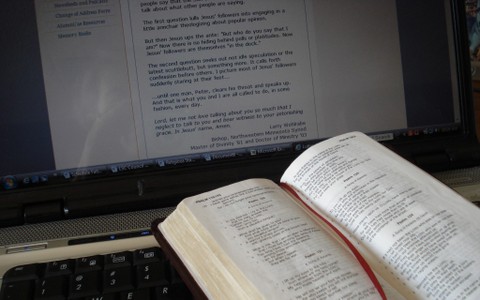Mark 11:12-18 NASB95
On the next day, when they had left Bethany, He became hungry. [13] Seeing at a distance a fig tree in leaf, He went to see if perhaps He would find anything on it; and when He came to it, He found nothing but leaves, for it was not the season for figs. [14] He said to it, “May no one ever eat fruit from you again!” And His disciples were listening.
[15] Then they came to Jerusalem. And He entered the temple and began to drive out those who were buying and selling in the temple, and overturned the tables of the money changers and the seats of those who were selling doves; [16] and He would not permit anyone to carry merchandise through the temple. [17] And He began to teach and say to them, “Is it not written, ‘MY HOUSE SHALL BE CALLED A HOUSE OF PRAYER FOR ALL THE NATIONS’? But you have made it a ROBBERS ’ DEN .” [18] The chief priests and the scribes heard this, and began seeking how to destroy Him; for they were afraid of Him, for the whole crowd was astonished at His teaching.
On Monday of holy week, Jesus did two things; He cursed the fig tree, and He cleansed the temple. There are a couple of truths here that I believe are interconnected that I want you to consider. Remember, everything Jesus did, even the sequence of his actions, carries divine purpose. Jesus never did anything arbitrarily, and he was always mentoring His disciples (“learners” – which is what the word “disciple” literally means). The Holy Spirit emphasizes through Mark that the fig tree Jesus cursed was not in season for bearing figs. The question, then, is why would Jesus curse a fig tree that didn’t produce fruit when it was impossible for the fig tree to do so since it was out of season. Jesus did not just die for us; He lived for us, demonstrating what a Spirit-filled life should look like. Jesus would give His disciples lectures, and then Jesus would model His teaching in the lab of life. Lectures; labs. Jesus used the tell and show model. What was He teaching the disciples, and what was He demonstrating to the disciples when He cursed the poor fig tree.
For one, He once again modeled the fact that Spirit-filled life is a supernatural one. Speaking to a fig tree by faith, decreeing that it will never bear fruit again, and that happening, is miraculous. As a matter of fact, verse 14 says that Jesus “answered and said to it, May no one ever eat fruit from you again!” Jesus answered the fig tree’s condition and spoke to it using a personal pronoun as if the fig tree could hear and understand Him. Jesus was teaching them that “In The Spirit” they could by faith speak to any condition, as if the thing could hear them, and decree its future.
Secondly, Jesus was teaching His disciples that He has the right to place demands on us when He knows what He’s asking of us is impossible for us to produce in the natural. What an important truth for disciples of Christ to learn. The Christian life isn’t hard; it is impossible, and only Jesus can do it. Step-by-step, our Christian life is lived facing battles and opportunities that are impossible for us to handle. Having said that, God never asks us to do anything that He considers unreasonable because He understands that everything He asks of us, He’s prepared to perform through us. “Faithful is He who calls you, Who also will do it.” 1 Thessalonians 5:24
OUR EXTREMITIES ARE GOD’S OPPORTUNITIES.
Now, you might ask, How is the event of Jesus cleansing the temple connected to the cursing of the fig tree? After cleansing the temple, we are told in verse 17 that Jesus began to teach and say to them, “Is it not written, My house shall be called a house of prayer for all the nations? But you have made it a den of thieves.” Jesus cleansed the temple because he wanted His action to be a teaching moment, not just for the people who were standing around, but for the disciples who were with Him all the time, and who had just witnessed the cursing of the fig tree. I believe the truth that Jesus was trying to speak in general is that if a house of prayer stops being a house of prayer, it becomes a den of thieves. Verse 18 says that the chief priests and the scribes, after hearing Jesus teach what He taught, were seeking how to destroy him, for they were afraid of Him for all the multitude was astonished at His teaching. It does not say that the people were astonished because Jesus cleansed the temple. It says that they were astonished by what he taught in light of cleansing the temple. The Pharisees were afraid because of what Jesus was teaching, because the demonic spirits that were motivating them were terrified that the house of prayer might actually become once again a house of prayer.
This is a great general truth, but what specifically does this have to do with what Jesus was trying to teach the disciples when he cursed the fig tree. Consider this. Through the cursing of the fig tree, Jesus was teaching them that the Christian life is going to be a supernatural one and that they would often find themselves in situations where it would seem as if God were demanding of them the impossible so that they could learn to steward the God of the impossible living through them. Jesus also knew that after Pentecost, the God of the impossible by the Holy Spirit would indwell each of them and that they themselves would therefore become Temples of God. As the Temple of the Holy Spirit, called to steward a life of impossibilities, it was imperative that they themselves stay “houses of prayer” so that spiritual thieves can’t kill, steal, and destroy all that God wants to be in and through them. Jesus is saying that the place of intimacy in prayer would breed the life of impossibilities they were called to walk in. Only childlike faith can trust in Jesus when faced with impossibilities, and only a childlike prayer life abiding in the presence of Abba nurtures childlike faith.

